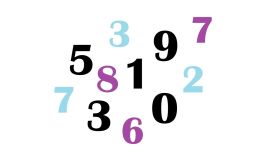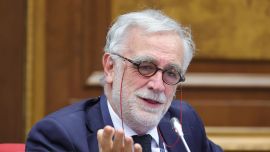The Taliban announced their new government on Tuesday, with a United Nations-blacklisted veteran of the hardline movement in the top role, after the group swept to power in a lightning offensive which toppled the US-backed president.
The announcement came as protests were growing against Taliban rule, with two people shot dead in the western city of Herat on Tuesday, a doctor told AFP.
The Islamists, notorious for their brutal and oppressive rule during their first stint in power from 1996 to 2001, had pledged a more "inclusive" brand of rule as US troops completed their chaotic pullout. But all the key positions on Tuesday went to core, veteran players in the movement.
Chief spokesman Zabihullah Mujahid told a press conference that the new government would be an interim one, and that veteran official Mullah Mohammad Hassan Akhund would serve as its new acting prime minister. He had served as deputy foreign minister under the Taliban's old regime, and is on a United Nations blacklist.
Mujahid also said that Taliban co-founder Abdul Ghani Baradar will be the deputy leader. Previously he served as the head of his movement's political office, overseeing the signing of the US withdrawal agreement in 2020.
Mullah Yaqoob, the son of the Taliban founder and late supreme leader Mullah Omar, was named defence minister, while the position of interior minister was given to Sirajuddin Haqqani, the head of the feared Haqqani network who also doubled up as a Taliban deputy.
Shortly after the announcement of the new lineup, Hibatullah Akhundzada, the secretive supreme leader of the Taliban made his first statement since his movement's stunning takeover of Afghanistan, saying that the new government would "work hard towards upholding Islamic rules and sharia law".
'Not inclusive'
Following their 20-year insurgency, the Taliban now face the colossal task of ruling Afghanistan, which is wracked with economic woes and security challenges – including from the Islamic State group's local chapter.
In what appeared to be a fresh sign that the Taliban are seeking to appease sceptics, Mujahid said the government – as yet incomplete – would only have an interim role.
"We will try to take people from other parts of the country," he said.
One analyst told AFP, however, that the new line-up was far removed from the softer brand of rule the movement had pledged.
"It's not at all inclusive, and that's no surprise whatsoever," said Michael Kugelman, a South Asia expert at the Woodrow Wilson International Center for Scholars. "The Taliban had never indicated that any of its cabinet ministers would include anyone other than themselves."
Washington said meanwhile it was in "no rush" to recognise the new government.
"It's really going to be dependent on what steps the Taliban takes," White House spokesperson Jen Psaki said. "The world will be watching, the United States included."
Deadly protest
Scattered protests in recent days have indicated that some Afghans do not believe in the Taliban's capacity to translate their promise of a more moderate rule into reality.
In Herat, scores of demonstrators marched, unfurling banners and waving the old Afghan flag – a black, red and green vertical tricolour with the national emblem overlaid in white.
Taliban militants opened fire to disperse the crowds who had gathered to protest against Pakistan – seen widely as a backer of Afghanistan's new rulers.
Two bodies were brought to the city's central hospital from the site of the protest, a doctor in Herat told AFP on condition of anonymity for fear of reprisals.
"They all have bullet wounds," he said.
Videos posted on social media of a separate rally showed more than a hundred people marching through the streets of Kabul under the watchful eye of armed Taliban members.
Demonstrations have also been held in smaller cities in recent days, where women have demanded to be part of a new government.
'Go away'
General Mobin, a Taliban official in charge of security in the capital, told AFP he had been called to the scene by guards who said that "women were creating a disruption. These protesters are gathered based only on the conspiracy of foreign intelligence," he claimed.
An Afghan journalist covering the demonstration told AFP his press ID and camera were confiscated by the Taliban.
"I was kicked and told to go away," he said.
Later, the Kabul-based Afghan Independent Journalists Association said 14 journalists – Afghan and foreign – were detained briefly during the protests before being released. Images shared online showed reporters with cuts and bruises to their hands and knees.
Meanwhile, US Secretary of State Antony Blinken said the Taliban had reiterated a pledge to allow Afghans to freely depart Afghanistan.
US President Joe Biden has faced mounting pressure amid reports that several hundred people, including US citizens, have been prevented for a week from flying out of an airport in northern Afghanistan.
Key players in the Taliban's new government
Afghanistan's Taliban on Tuesday announced key posts for their new government, after the hardline Islamists seized control of the country and ousted the previous regime last month.
Mullah Mohammad Hassan Akhund, who is on a UN sanctions list, was named as leader, while Taliban co-founder Abdul Ghani Baradar will be his deputy.
The Taliban's inner workings and leadership have long been shrouded in secrecy – even when they ruled Afghanistan from 1996 to 2001.
Several cabinet posts are yet to be announced. Here is a rundown of what is known:
Mohammad Hassan Akhund, acting prime minister
Mullah Mohammed Hassan Akhund is a Taliban veteran who was a close associate and political advisor to Mullah Omar, the founder of the movement and its first supreme leader. A member of the group's Supreme Council, he served as deputy foreign minister in their previous regime, and was placed on a UN Security Council sanctions list connected to the "acts and activities" of the Taliban. From Kandahar, he also served as the Taliban governor of the key province. The United Nations said he had a reputation of having been "one of the most effective Taliban commanders."
Mullah Baradar, the co-founder
Abdul Ghani Baradar, named as deputy to Hassan, was raised in Kandahar – the birthplace of the Taliban movement. Like most Afghans, Baradar's life was forever altered by the Soviet invasion of the country in the late 1970s, transforming him into an insurgent. He was believed to have fought side-by-side with Mullah Omar. The two would go on to found the Taliban movement in the early 1990s during the chaos and corruption of the civil war that followed the Soviet withdrawal. After the Taliban regime was toppled in 2001 by US-led forces, Baradar is believed to have been among a small group of insurgents who approached interim leader Hamid Karzai with a potential deal that would have seen the militants recognise the new administration. Arrested in Pakistan in 2010, Baradar was kept in custody until pressure from the United States saw him freed in 2018 and relocated to Qatar. This is where he was appointed head of the Taliban's political office and oversaw the signing of the troop withdrawal agreement with the United States.
Sirajuddin Haqqani, the Haqqani network
The son of a famed commander from the anti-Soviet jihad, Sirajuddin Haqqani has doubled as the deputy leader of the Taliban and head of the powerful Haqqani network. He will be interior minister in the new regime. The Haqqani network is a US-designated terror group long viewed as one of the most dangerous militant factions in Afghanistan. It is infamous for its use of suicide bombers and is believed to have orchestrated some of the most high-profile attacks in Kabul over the years. The network is also accused of assassinating top Afghan officials and holding kidnapped Western citizens for ransom – including US soldier Bowe Bergdahl, released in 2014. Known for their independence, fighting acumen, and savvy business dealings, the Haqqanis are mainly based in eastern Afghanistan and hold considerable sway over the Taliban's leadership council.
Mullah Yaqoob, the scion
The son of Taliban co-founder Mullah Omar, Mullah Yaqoob heads the group's powerful military commission, which oversaw the vast network of field commanders charged with executing the insurgency. On Tuesday, he was named as defence minister. Yaqoob's father enjoyed cult-like status as the Taliban leader, and that potent lineage makes him a unifying figure in the movement.
– TIMES/AFP


























Comments